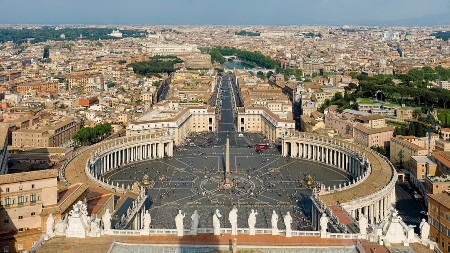We ask you, urgently: don’t scroll past this
Dear readers, Catholic Online was de-platformed by Shopify for our pro-life beliefs. They shut down our Catholic Online, Catholic Online School, Prayer Candles, and Catholic Online Learning Resources—essential faith tools serving over 1.4 million students and millions of families worldwide. Our founders, now in their 70's, just gave their entire life savings to protect this mission. But fewer than 2% of readers donate. If everyone gave just $5, the cost of a coffee, we could rebuild stronger and keep Catholic education free for all. Stand with us in faith. Thank you.Help Now >
ACLJ: Ten Commandments' Victory at Supreme Court
FREE Catholic Classes
In Pleasant Grove City v. Summum the American Center for Law and Justice (ACLJ) represented the Utah city in a challenge to a display of the Ten Commandments in a city park.
Highlights
American Center for Law and Justice (www.aclj.org/)
2/27/2009 (1 decade ago)
Published in Politics & Policy
WASHINGTON (ACLJ) - In a unanimous decision, the Supreme Court of the United States issued a landmark First Amendment ruling clearing the way for governments to accept permanent monuments of their choosing in public parks. The decision came in the case of Pleasant Grove City v. Summum, a critical First Amendment case in which the American Center for Law and Justice (ACLJ) represented the Utah city in a challenge to a display of the Ten Commandments in a city park.
"This decision represents a resounding victory for government speech," said Jay Sekulow, ACLJ Chief Counsel who presented oral arguments before the Supreme Court on behalf of Pleasant Grove City, UT. "The decision gives government the right to speak for itself and the ability to communicate on behalf of its citizens. It's a significant decision that clears the way for government to express its views and its history through the selection of monuments - including religious monuments and displays.
"This decision also puts a bookend on the litigation surrounding the display of the Ten Commandments that's been taking place for years across the country. The critical question before the Court was, "Can a city decide which permanent, unattended monuments, if any, to install on city property?" Without dissent, the Court said "Yes." We're delighted that the Court upheld the important distinction between government speech and private speech."
The ACLJ asked the high court to overturn a decision by the U.S. Court of Appeals for the Tenth Circuit that ordered Pleasant Grove City, UT, to accept and display a monument from a self-described church called Summum because the city displays a Ten Commandments monument donated by the Fraternal Order of Eagles.
In a 9-0 decision announced by Justice Samuel Alito, the Supreme Court concluded: "In sum, we hold that the City's decision to accept certain privately donated monuments while rejecting respondent's is best viewed as a form of government speech. As a result, the City's decision is not subject to the Free Speech Clause, and the Court of Appeals erred in holding otherwise. We therefore reverse."
The high court concluded that the government has the right to speak for itself without violating the Constitution. "The Free Speech Clause restricts government regulation of private speech; it does not regulate government speech . . . A government entity has the right to 'speak for itself' . . . . it is not easy to imagine how government could function if it lacked this freedom . . . A government entity may exercise this same freedom to express its views when it receives assistance from private sources for the purpose of delivering a government-controlled message."
The ACLJ contended that the Tenth Circuit made a serious error confusing government speech with private speech. In its briefs, the ACLJ argues that "a city's selection of which items to display in a park - like its selection of decorations for government buildings - is government speech, and no private entity can claim a 'Me too!' right of access for its own preferred displays."
---
The American Center for Law and Justice (ACLJ) focuses on constitutional law and is based in Washington, D.C. This article is used with permission.
Join the Movement
When you sign up below, you don't just join an email list - you're joining an entire movement for Free world class Catholic education.

-

-
Mysteries of the Rosary
-
St. Faustina Kowalska
-
Litany of the Blessed Virgin Mary
-
Saint of the Day for Wednesday, Oct 4th, 2023
-
Popular Saints
-
St. Francis of Assisi
-
Bible
-
Female / Women Saints
-
7 Morning Prayers you need to get your day started with God
-
Litany of the Blessed Virgin Mary
Daily Catholic
 Daily Readings for Thursday, January 16, 2025
Daily Readings for Thursday, January 16, 2025 St. Fursey: Saint of the Day for Thursday, January 16, 2025
St. Fursey: Saint of the Day for Thursday, January 16, 2025 Prayer for a Blessing on the New Year: Prayer of the Day for Tuesday, December 31, 2024
Prayer for a Blessing on the New Year: Prayer of the Day for Tuesday, December 31, 2024- Daily Readings for Wednesday, January 15, 2025
- St. Paul the Hermit: Saint of the Day for Wednesday, January 15, 2025
- St. Theresa of the Child Jesus: Prayer of the Day for Monday, December 30, 2024
![]()
Copyright 2024 Catholic Online. All materials contained on this site, whether written, audible or visual are the exclusive property of Catholic Online and are protected under U.S. and International copyright laws, © Copyright 2024 Catholic Online. Any unauthorized use, without prior written consent of Catholic Online is strictly forbidden and prohibited.
Catholic Online is a Project of Your Catholic Voice Foundation, a Not-for-Profit Corporation. Your Catholic Voice Foundation has been granted a recognition of tax exemption under Section 501(c)(3) of the Internal Revenue Code. Federal Tax Identification Number: 81-0596847. Your gift is tax-deductible as allowed by law.






 Daily Readings for Thursday, January 16, 2025
Daily Readings for Thursday, January 16, 2025 St. Fursey: Saint of the Day for Thursday, January 16, 2025
St. Fursey: Saint of the Day for Thursday, January 16, 2025 Prayer for a Blessing on the New Year: Prayer of the Day for Tuesday, December 31, 2024
Prayer for a Blessing on the New Year: Prayer of the Day for Tuesday, December 31, 2024


